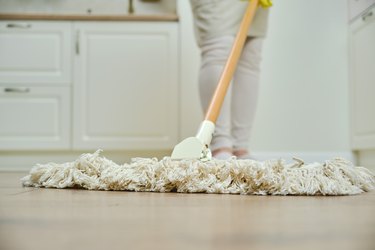
Inexpensive and natural, distilled white vinegar has acidic properties that make it a popular choice for eliminating germs on many home surfaces, including counters, sinks and, yes, even floors. Vinegar is very rarely used as a cleaning agent on its own, however. Instead, to make a floor cleaner with white vinegar, you'll need to mix it with water. The right vinegar to water ratio for cleaning floors will depend on what type of floors you have.
Cleaning Floors With White Vinegar
Video of the Day
In theory, you could clean porcelain and linoleum floors with vinegar alone. However, that would require purchasing large quantities of vinegar. That is why distilled white vinegar is typically mixed with water for cleaning. For porcelain and linoleum floors, a concentrated solution with a ratio of at least 50/50 water and vinegar will yield the best results. You could safely use a higher concentration of vinegar if you wish, however.
Video of the Day
Because it is acidic, vinegar can cause damage to hardwoods. Therefore, if you are cleaning wood floors with white vinegar, you'll want to dilute the vinegar more than you would for porcelain or linoleum. Use a cup of vinegar per gallon of warm water for wood floors. This same ratio is appropriate for floors made of ceramic tile and natural stone.
Cleaning Carpets With Vinegar
A water and vinegar solution can also be effective at deodorizing carpets and removing carpet stains, though you should avoid pouring vinegar directly onto the carpet. Instead, combine a cup of vinegar and a gallon of hot water and pour the solution into your carpet cleaner. Then, refill the carpet cleaner with plain water and go over the carpeted area a second time in order to remove the vinegar.
To remove stains from a carpet, combine one part vinegar and two parts water in a spray bottle. If the stain is still wet, soak up the moisture with a cloth or paper towel. Then, spray the stained area with a water and vinegar solution. Blot the area dry using another clean cloth.
Tips for Cleaning With Vinegar
The strong scent of vinegar can be off-putting for many people. If you are one of those people who dislikes vinegar for this reason, add a few drops of your favorite essential oil to the water and vinegar solution in order to mask the smell. If you have the time, you can also add the peel of an orange or lemon to the solution and let it soak in order to infuse the vinegar with a more pleasant citrus smell.
Vinegar can cause some wood finishes to lose their luster. Therefore, if you want to use white vinegar to clean hardwood floors, you should test the solution on a small area in a corner or other discrete part of the room first to see the effect. For this same reason, it is best to avoid using vinegar on laminate floors.
For safety reasons, you should never mix vinegar and bleach, which releases fumes that are toxic if inhaled. Note that vinegar should not be used in steam cleaners, as it can damage the appliance.
- HGTV: Mopping Floors With Vinegar
- Better Homes & Gardens: How to Clean Hardwood Floors for Scuff-Free Shine
- Better Homes & Gardens: 12 Natural Carpet Stain Removers for Chemical-Free Cleaning
- Real Simple: The Best Homemade Carpet Cleaners for Removing Stains From Every Type of Rug
- House Cleaning HowTos: Cleaning With Vinegar